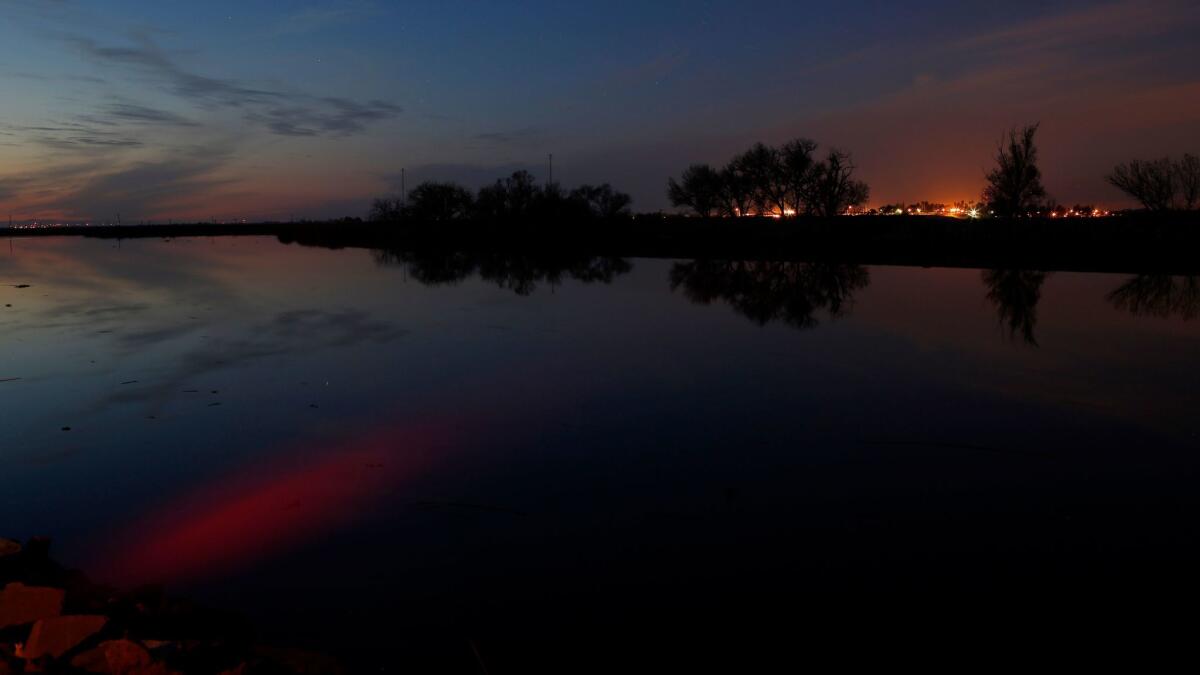Gov. Brown visits L.A. to lobby for the $17-billion delta water project

With two key California WaterFix votes looming, Gov. Jerry Brown expressed confidence Thursday that water agencies will commit to enough funding to sustain the massive project.
Brown was in Los Angeles to lobby for the $17-billion proposal, which would re-engineer the Sacramento-San Joaquin Delta, the hub of California’s complex waterworks.
“I’m just trying to put the ball over the goal line,” he said in a telephone interview in between visits to the Metropolitan Water District of Southern California and the Southern California Assn. of Governments.
MWD’s board is scheduled to vote Tuesday on a $4.3-billion buy-in to WaterFix, which is a top priority for Brown. Two days later, the Kern County Water Agency board is expected to take its vote.
As the two largest contractors in the State Water Project, the agencies’ participation is critical to WaterFix, which is to be financed by the urban and agricultural districts that get deliveries from the south delta.
That financing plan suffered a major blow last month when the Westlands Water District, the nation’s largest irrigation district, voted against joining the project, saying it was unaffordable.
But Brown said Thursday that WaterFix could survive, albeit in a scaled-down version, without money from Westlands and other agricultural districts that receive delta supplies from the federal Central Valley Project.
“The project can be altered to reduce the costs if the federal contractors don’t want to be a part of it,” the governor said. “The state needs the water. We’re not going to commit suicide. We gotta have it.”
Brown, who met this week with members of the Kern County Water Agency, was optimistic about the upcoming votes. “I think we will have enough funds for the project,” he said.
His visit to Southern California was reminiscent of the lobbying his father — Gov. Pat Brown — did more than half a century ago to win support for the State Water Project, which sends delta supplies hundreds of miles down the California Aqueduct to the Southland.
It was construction of the state project that helped send the delta on a downward environmental spiral, triggering endangered species protections that in recent decades have restricted delta deliveries.
WaterFix calls for the construction of new diversions on the Sacramento River in the north delta that would feed two enormous tunnels connected to existing pumping plants in the south delta.
Proponents — including most of the state’s major water agencies — hope that by withdrawing less water from the south delta, the tunnels will diminish environmental restrictions on deliveries.
Opponents — primarily environmental groups and delta growers — argue that delta conditions will worsen with the new diversions, hurting water quality and further depleting imperiled salmon populations.
The funding issue has loomed over the project for years. Now it has reached a critical point, with agencies deciding whether to open their wallets.
Environmental groups in Southern California argue that the billions of ratepayer dollars that would go to WaterFix would be better spent developing local supplies such as recycled water or stormwater capture.
To avoid a violation of the Brown Act, which generally requires legislative bodies to gather in open session, the governor met with only some members of the MWD board at the agency’s Granada Hills water treatment plant. The session did not include MWD’s Los Angeles delegation.
“They’re hesitant to form an opinion yet. They’re waiting,” Brown said of the city’s board members.
Twitter: @boxall
More to Read
Sign up for Essential California
The most important California stories and recommendations in your inbox every morning.
You may occasionally receive promotional content from the Los Angeles Times.











